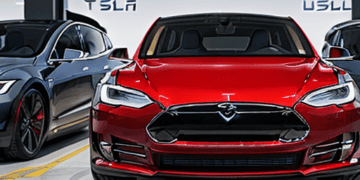Tesla reported a first-quarter total gross profit margin of 19.3 percent, missing market estimates and marking its lowest since Q4 2020. Analysts had anticipated a margin of 22.4 percent. The lower gross margin, a key financial metric, reflects a series of aggressive price cuts implemented by Tesla to stimulate demand amid economic challenges and increasing competition.
Shares of the Austin-based electric vehicle (EV) maker declined by nearly 4 percent in after-hours trading in response to the earnings report. Tesla, led by CEO Elon Musk, has strategically reduced prices in the United States, China, and other markets to drive volume growth and maintain its market position during an economic downturn.
The automotive industry, particularly in China, is experiencing a price war, prompting Tesla to adjust its pricing strategy. Analysts suggest that further price cuts may be necessary to navigate the competitive landscape and sustain demand for its existing vehicle lineup.
In the United States, where federal subsidies have only modestly boosted sales, Tesla has executed six price cuts in 2023. These reductions have impacted the automotive gross margin. Despite the price adjustments, CFO Zachary Kirkhorn had previously committed not to go below margins of 20 percent and an average selling price of $47,000 across models.
Tesla emphasized its expectation to achieve approximately 1.8 million vehicle deliveries in 2023. The company has faced challenges in meeting delivery targets, citing logistics issues that resulted in delivering about 18,000 fewer cars than produced in the first quarter.
The Q1 revenue reached $23.33 billion, slightly surpassing the consensus estimate of $23.21 billion. The net profit for the quarter was reported at $2.5 billion, down from $3.32 billion in the same period last year.
While Tesla’s consistent price cuts may impact its margins in the short term, analysts note that the company’s strategy could pose challenges for competitors in the electric vehicle market. The sixth price cut, announced just before the earnings report, affected Tesla’s stock and influenced the shares of EV rivals Lucid and Rivian in post-market trading. The EV sector’s profitability remains a challenge for many competitors, contrasting Tesla’s historically strong financial performance.
The evolving landscape of electric vehicle competition, coupled with economic considerations, suggests ongoing strategic adjustments for Tesla and its competitors in the electric vehicle market.
Breaking supply chain news is just a click away at The Supply Chain Report. Enhance your knowledge of international trade at ADAMftd.com with free tools.
#Tesla #ElonMusk #ElectricVehicles #EVMarket #TeslaEarnings #GrossMargin #PriceCuts #AutomotiveIndustry #TeslaQ1 #EVCompetition #ElectricCars #Lucid #Rivian #EVPriceWar #TeslaStock #EconomicDownturn #VehicleDeliveries #AutomotiveSales #EVPriceStrategy #TeslaRevenue #Q1Results















